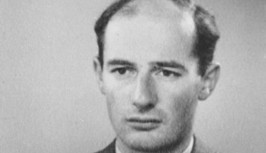Sixty-nine years after his disappearance, both Sweden and Russia have the chance to rehabilitate their shameful silence about the heroic diplomat.
On January 17, 1945, 69 years ago, Raoul Wallenberg left Budapest, together with his personal driver, Vilmos Langfelder, for a meeting with the Soviet commander, Marshal Malinovsky, at Debrecen.
Wallenberg’s idea was to discuss with the Soviet Marshal the future of the surviving Hungarian Jews. Instead, both were taken into “protective custody” by the feared NKVD, which was associated with Stalin’s secret police, and never resurfaced up to this very day.
Wallenberg had arrived in Budapest on July 9, 1944, after having been recruited by the War Refugee Board and was granted diplomatic status at the Swedish legation. What he achieved in only six months is almost unfathomable. Using his bold imagination, creativity, organizational skill and sheer courage, he managed to save the lives of scores of innocent lives. Rivers of ink have already told his magnificent story.
He was one of humanity’s greatest heroes; a young Swedish aristocrat who became an unlikely rescuer.
Almost seven decades have elapsed since his disappearance and historians are still debating Stalin’s motives behind Wallenberg’s cruel imprisonment and probable ensuing assassination. Even more inexplicable is the current reluctance of the Russian authorities to allow scholars and historians full and unfettered access to the NKVD/KGB archives.
Back in 2006, replying to a letter we sent to Russian President Vladimir Putin, Alexander Darchiev (then deputy head of the Russian Embassy in Washington, D.C.) wrote to us: “The death of Mr. Wallenberg lies with the USSR leadership at that time and on Joseph Stalin personally.”
We don’t have any reason to doubt Mr. Darchiev’s assertion; but, assuming his information is accurate, it is highly unlikely that the elimination of such a high-profile individual could have been perpetrated in the Stalinist era without leaving a significant paper trail.
Russia is the key responsible state for this unfinished tragedy, but she is not alone.
Sweden’s role has been and still is hard to comprehend. Its successive governments have failed Raoul Wallenberg, a son of Sweden: They have left him abandoned in the Soviet Gulag, like an army leaving behind a bleeding soldier in the battlefield.
In 2012, coinciding with Wallenberg’s 100th birthday, Sweden’s Minister of Integration, Erik Ullenhag, made a candid statement:
“I’m so proud to represent the same country as Raoul Wallenberg. But to be honest, I can’t be proud of Swedish history concerning Wallenberg. I am sorry we left the Wallenberg family so alone. I am sorry that we did not for a long time tell the story of Raoul Wallenberg. I am sorry we didn’t dare to do enough to find out what happened to the brave Swedish diplomat”.
This is a good step, but it is certainly not enough. Even today, almost 70 years after his disappearance, Sweden still has the power and the clout to exercise pressure on Russia and demand clear answers about his fate. In a recent video-taped interview, Raoul’s living half-sister, Nina Lagergren, admitted that Sweden had not “been helpful” in trying to bring her brother back.
Similar questions can be asked about the strikingly passive role played by the powerful Wallenberg family at that time, particularly Jacob and Marcus Wallenberg, first cousins of Raoul’s father, who were at the helm of the family economic concern. This is very well reflected in the September 18, 1947, letter that John Pehle, executive director of the War Refugee Board (the body that picked-up Wallenberg for the Budapest mission) to Henry Morgenthau , secretary of the Treasury during WWII.
Pehle’s letter depicts the plight of Raoul’s closest family (mother, step-father, half-brother Guy and half-sister Nina) and their desperate attempts to bring him back home. In his postscript, Pehle writes: “I might add that while Raoul Wallenberg bears the name of a prominent and wealthy family, his problem and those of his immediate relatives are of no concern to the more prominent Wallenbergs.”
We, at the International Raoul Wallenberg Foundation, keep on working to spread Raoul’s legacy through educational programs and research. At the same time, we keep on campaigning for Raoul “the victim.” Last year, in a special meeting with UN Secretary-General Ban Ki-moon, we announced a 500,000-euro reward for scientifically verifiable information which could shed light on the fate and whereabouts of Raoul Wallenberg and his chauffeur.
Despite the difficulty of this battle, we feel a moral duty pursuing it. We await the day that Sweden creases her abandonment of her heroic son, and Russia unburdens its conscience and its archives.
Eduardo Eurnekian is chairman of the International Raoul Wallenberg Foundation, and Baruch Tenembaum is it founder.

